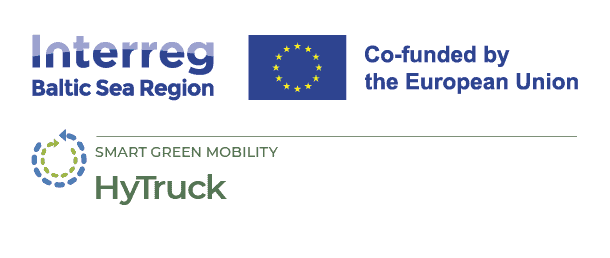
HyTruck Breakfast Briefing #20: Exploring Hydrogen and Renewable Energy in Mecklenburg-Vorpommern
12 May 2025
Summary
The May HyTruck Breakfast Briefing focused on hydrogen and renewable energy activities in Mecklenburg-Vorpommern, Germany. The session was moderated by Katrin Bockler, Ministry of Economics, Infrastructure, Tourism and Labour Mecklenburg-Vorpommern, and featured presentations from Tom Rückborn (Wind Energy Network) and Philipp Houschka-Hering (Ministry of Economic Affairs, Energy Department). The speakers offered in-depth insights into current and planned hydrogen initiatives and the region’s green industrial development strategy.
Hydrogen projects in Mecklenburg-Vorpommern
Tom Rückborn provided an overview of both ongoing and planned hydrogen projects. A historic reference was made to the RH2-PTG pilot project (2011), where a wind-powered electrolyzer was implemented to manage blackout scenarios. Current projects include the Campfire initiative developing ammonia-based fuels for maritime applications, and the Hydrogen Research Factory in Rostock and Poppendorf exploring alternative fuels such as methanol and ammonia.
The H2Apex project in Laage was highlighted for its operational electrolyzer producing hydrogen for regional transport, including a growing fleet of hydrogen buses, projected to become Germany’s second largest.
Further examples included a methanol-powered crew transfer vessel by Vestas, the first of its kind worldwide, currently operating from Rügen Island using green methanol imported from Sweden.
Future hydrogen infrastructure
Planned large-scale electrolysis projects under the Important Projects of Common European Interest (IPCEI) scheme were discussed. These include a proposed 100 MW electrolyzer expansion by H2Apex and a 55 MW installation by ENERTRAG. Challenges around pipeline connectivity and funding were noted, particularly in the cancellation of a southbound hydrogen transport line. However, plans to link with the national hydrogen backbone via the Gascade FLOW pipeline remain under discussion.
Mecklenburg-Vorpommern’s offshore wind potential was cited as enabling future electrolyzer capacities up to 1 GW in sites like Rostock and Lubmin. Other emerging initiatives include integrated hydrogen and CO₂ utilization at sites like Anklam, with additional electrolyzer installations being considered in Karlsburg, Güstrow, and Mukran, albeit subject to funding and pipeline development.
Green Industrial Areas and Lübesse Energy Village
Philipp Houschka-Hering introduced the state-level Green Industrial Areas initiative, developed from earlier Interreg cooperation. The program supports the transformation of existing industrial zones into sustainable hubs powered by local renewable energy. Certification criteria include energy supply from sources within 10 km, energy efficiency improvements, and sustainable land management.
Three sites have been certified, and several others are candidates. A related Interreg project involving partners across the Baltic Sea region seeks to harmonize certification standards and provide a development toolbox for future green industrial areas.
The Energy Village project in Lübesse was presented as a comprehensive model integrating wind and solar power, electrolysis, methanation, district heating, and potential aquaculture. Waste heat from electrolysis and methanation processes would be recovered to supply residential heating, while purified oxygen could support fish farming. Logistics partners on site are expected to utilize LNG produced locally.
Next steps and events
The session concluded with announcements of upcoming events, including:
- A life-cycle assessment seminar on hydrogen trucks (13 May) hosted by Chalmers University.
- The European Conference on Hydrogen P2X in Copenhagen (11–12 June).
- The European Hydrogen Week in Brussels and the Hydrogen Technology Expo Europe in Hamburg (autumn 2025).
The next HyTruck Breakfast Briefing will be held on 4 June, hosted by Localiser.
Q&A
- A question was asked about the status of future hydrogen projects and whether contracts had been signed or if uncertainties remained.
It was clarified that there remains significant uncertainty, especially for large-scale electrolyzer projects since such capacities are not yet in operation globally. Smaller-scale projects are seen as more realistic in the near term, with Anklam and Lubmin identified as promising locations due to infrastructure and industrial synergies.
- A question was asked about what motivates hydrogen offtakers to purchase more expensive green hydrogen instead of cheaper grey alternatives.
It was explained that the key motivation lies in future preparedness. With global plans to phase out fossil fuels by 2050, green hydrogen users aim to position themselves as forward-looking and sustainable actors, aligning early with long-term climate goals.
- A question was raised about whether Mecklenburg-Vorpommern is leading in the development of green industrial areas.
The response confirmed that the state is ahead in terms of having a coordinated initiative. While other regions like Hamburg and Frankfurt have advanced examples, Mecklenburg-Vorpommern’s organized, statewide approach is currently unique in Germany.





